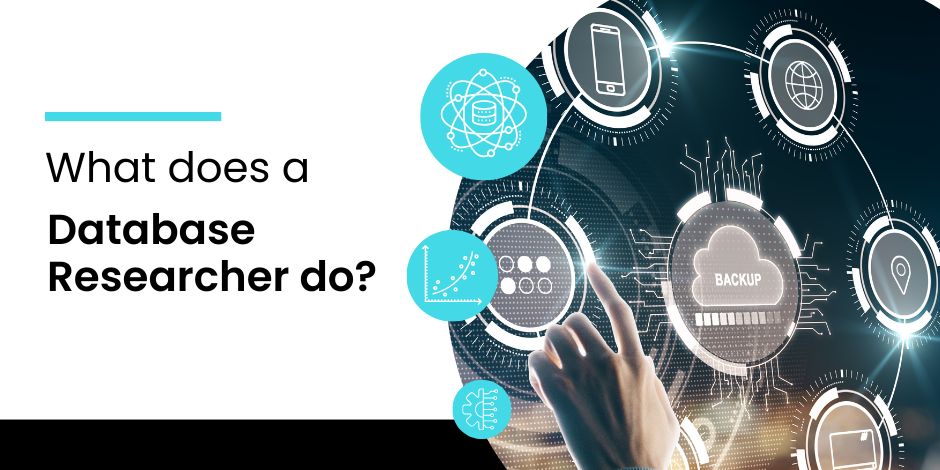What Is a Database Researcher?

Stay Informed With Our Weekly Newsletter
Receive crucial updates on the ever-evolving landscape of technology and innovation.
Ever wondered what is a database researcher?
With the ever-increasing amount of data being generated and stored, the role of a database researcher has become crucial in various industries.
What is a Database Researcher? Understanding the role

You may be wondering, specifically, what is a database researcher?
A database researcher is responsible for conducting in-depth analysis, designing efficient data structures, and developing innovative techniques to optimise the storage and retrieval of data.
They play a vital role in improving the performance and scalability of databases, ensuring data integrity and security, and solving complex data-related challenges.
What is a Database Researcher? Key Responsibilities
Database researchers are tasked with various responsibilities, which include:
- Researching to identify new database technologies and methodologies.
- Designing and implementing algorithms for data storage and retrieval.
- Testing and evaluating the performance of different database systems.
- Collaborating with software developers and data scientists to optimise data-driven applications.
- Contributing to academic publications and conferences to share research findings.
Database researchers help organisations make informed decisions based on reliable and efficient data management practices by fulfilling these responsibilities.
What is a Database Researcher? Required skills
To excel as a database researcher, individuals must possess technical, analytical, and problem-solving skills. Some essential skills include:
- Strong knowledge of database systems and concepts.
- Proficiency in SQL and other database query languages.
- Expertise in programming languages such as Python, Java, or C++.
- Analytical and critical thinking abilities to dissect complex data challenges.
- Ability to work in a team and communicate research findings effectively.
- Familiarity with technologies such as cloud computing and big data.
These skills enable database researchers to navigate the evolving landscape of data management and contribute to cutting-edge research in the field.
What is a Database Researcher? The academic path
A database researcher requires a solid computer science and data management foundation. Here are some key milestones in the academic journey:
What is a Database Researcher? Relevant degrees and qualifications
To start a career in database research, individuals typically pursue a relevant undergraduate degree in computer science, software engineering, or information technology.
These programs comprehensively understand core computer science principles, algorithms, and database systems.
For more specialised knowledge, aspiring database researchers often pursue postgraduate degrees such as a Master’s or Doctorate in database systems or data science.
These advanced degrees allow individuals to delve deeper into the theoretical foundations of database research and gain hands-on experience conducting independent research.
In addition to formal education, database researchers are encouraged to obtain certifications.
Certifications such as Oracle Certified Professional, Microsoft Certified: Azure Database Administrator Associate, or the Institute of Data’s Data Science & AI program validate their expertise in specific database technologies and can enhance career prospects.
Importance of continuous learning in database research
Database research is rapidly evolving, with new technologies and techniques constantly emerging.
Therefore, continuous learning is essential for staying up-to-date and relevant as a database researcher.
Professionals in this field should actively engage in ongoing professional development, such as attending conferences, workshops, and webinars.
These events provide excellent opportunities to network, learn about the latest advancements, and gain insights from industry experts.
Furthermore, keeping an eye on research publications and academic journals is crucial for staying informed about the latest trends and breakthroughs in database research.
What is a Database Researcher? The professional journey

Once armed with the necessary qualifications, aspiring database researchers can embark on their professional journey.
Entry-level roles in Database Research
Upon entering the job market, individuals starting their career in database research may secure entry-level positions such as database analyst, database administrator, or junior data scientist.
These roles provide valuable hands-on experience and an opportunity to apply theoretical knowledge to real-world data challenges.
Working in these roles allows individuals to develop practical skills in designing and managing databases, analysing data, and troubleshooting performance issues.
It also provides exposure to various database technologies and gives them an understanding of industry best practices.
Career progression and advancement opportunities
With experience and expertise, database researchers can progress to more senior roles, such as senior database researcher, data architect, or research team lead.
These roles involve leading research projects, mentoring junior researchers, and contributing to developing innovative database solutions.
Database researchers with a strong track record of research publications, patents, and industry impact may also pursue academic opportunities as professors or researchers in esteemed universities and research institutions.
Furthermore, the growing demand for data-driven insights and the increasing reliance on databases in various sectors present ample career advancement opportunities for aspiring database researchers.
What is a Database Researcher? Their impact on various industries
The role of database researchers extends beyond the realm of academia and research institutions.
The role of Database Researchers in the tech industry
In the technology sector, database researchers are instrumental in developing efficient and scalable database systems that power mission-critical applications.
They contribute to designing and implementing databases that handle vast amounts of data, ensuring high performance and data integrity.
Furthermore, database researchers are crucial in developing big data and cloud computing technologies.
Improving massive datasets’ storage, processing, and analysis enables organisations to extract valuable insights and drive informed decision-making.
Database research in healthcare and life sciences
In healthcare and life sciences, database researchers work on crucial projects such as developing patient data management systems, designing genomic databases, and improving clinical decision support systems.
Database researchers help healthcare organisations store, retrieve, and analyse patient records effectively, leading to improved diagnostics, treatment planning, and healthcare delivery.
Their contributions to genomic databases enable advancements in personalised medicine.
At the same time, their work on clinical decision support systems ensures that healthcare professionals have access to accurate and up-to-date information.
What is a Database Researcher? Future trends

The database research field continuously evolves to keep up with emerging technologies and evolving data management needs.
The influence of artificial intelligence (AI) on database research
AI is poised to revolutionise the field of database research.
Machine learning algorithms and AI techniques can enhance the performance of databases by optimising query execution, automating data management tasks, and improving data security and privacy.
Database researchers increasingly explore AI-driven approaches to tackle complex data challenges and develop intelligent database systems that adapt to changing requirements.
The growing importance of data security in database research
As data continues to be a valuable asset for organisations, ensuring robust data security measures is paramount.
Database researchers are at the forefront of developing novel security mechanisms, encryption techniques, and access control mechanisms to protect sensitive data.
With the advent of technologies such as blockchain, database researchers are exploring innovative approaches to ensure the integrity and privacy of data, establishing trust in distributed database systems.
Conclusion
Becoming a database researcher is a highly rewarding and intellectually challenging career path.
This comprehensive guide has provided an overview of the role of a database researcher, including their responsibilities, required skills, academic path, professional journey, industry impact, and future trends.
With the exponential growth of data and its inherent challenges, the demand for skilled database researchers is expected to rise.
Aspiring professionals in this field can leverage their technical knowledge, analytical skills, and passion for data to significantly impact industries and contribute to advancing database research.
Are you ready to boost your data science career?
The Institute of Data’s Data Science & AI program offers a balanced, in-depth, curriculum taught by industry-professional instructors and a focus on real-world applications.
Elevate your career with the support and resources you’ll need in this fascinating field of tech.
Ready to learn more about our programs? Contact our local team for a free career consultation.




